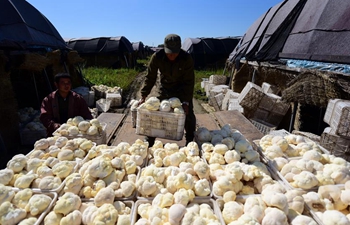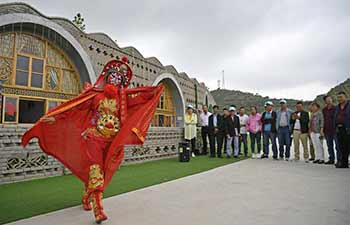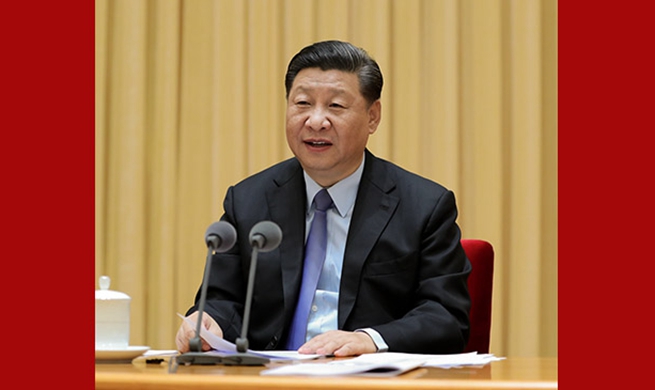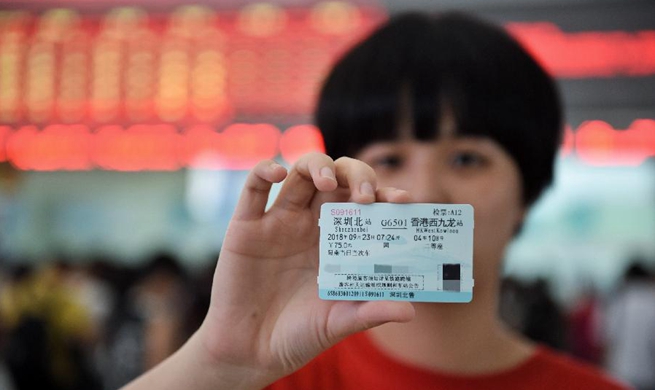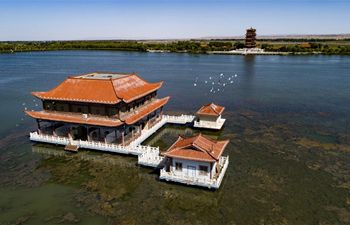WASHINGTON, Sept. 10 (Xinhua) -- The Trump administration on Monday announced its decision to close the Palestine Liberation Organization (PLO)'s office in Washington, a move to further press the Palestinians into peace talks with Israel while invoking strong objections.
The U.S. State Department unveiled the decision in a statement released Monday, citing the Palestinians' lack of "steps to advance the start of direct and meaningful negotiations with Israel."
"PLO leadership has condemned a U.S. peace plan they have not yet seen and refused to engage with the U.S. government with respect to peace efforts and otherwise," said U.S. State Department spokesperson Heather Nauert in the statement.
The Palestinian officials denounced the U.S. decision as "reckless" and "bullying."
"We don't think this is just about bullying ... we believe this is about the implementing of Israel's grocery list," said Husam Zomlot, the Palestinian representative to Washington, told reporters on Monday. Senior Palestinian officials have been informed earlier by the Trump administration about the closure of the mission.
Zomlot also described ties between the United States and the Palestinians as at a "historical low."
Meanwhile, the Trump administration still voiced optimism about the long stalled Middle East peace process. "We are very much committed to the process, and we're still hopeful we can get there," said White House Press Secretary Sarah Sanders in a daily briefing Monday.
The U.S. government gives a waiver to the Palestinian mission in Washington every six months to keep it function normally.
Heather also noted in the statement that the decision was linked with U.S. concerns with Palestinian attempts to prompt an investigation into Israel by the International Criminal Court (ICC).
The Palestinians have requested the ICC to investigate Israel on various issues including disputed settlement buildings in the occupied West Bank, the civilian casualties in the 2014 Gaza war and others.
Despite having opened a preliminary probe in 2015, the court has yet to move to the next stage.
The Palestinian officials have pledged to push forward their efforts at the ICC unwaveringly.
Shortly after the State Department announcement, John Bolton, the U.S. national security advisor, followed up in his speech at a think tank in Washington.
"The Trump administration will not keep the office open when the Palestinians refuses to take steps to start direct and meaningful negotiations with Israel," he said.
Bolton also threatened to impose sanctions against judges and prosecutors of the ICC if it pursues investigation against the United States, Israel or other U.S. allies.
Bolton said the Trump administration will "fight back" if the ICC proceeds with opening an investigation into alleged war crimes committed by U.S. military members and intelligence personnel in Afghanistan.
"The ICC prosecutor has requested to investigate these Americans for alleged detainee abuse, and perhaps more," said Bolton, describing it as an "utterly unfounded, unjustifiable investigation."
"We will not cooperate with the ICC. We will provide no assistance to the ICC. We will not join the ICC. We will let the ICC die on its own," said Bolton in his harshly-worded remarks.
The ICC's aim is to bring to justice the perpetrators of war crimes, crimes against humanity and genocide.
"Their (the ICC) announcement that they would consider opening an investigation into -- among other parties -- U.S. soldiers in Afghanistan is a threat to American sovereignty," said Sanders.
"If they proceed with that, then the United States would consider those options that Ambassador Bolton laid out today," the White House spokeswoman added.
"What Trump is doing is nothing really different than Bush," Ford O'Connell, a Republican and news commentator who frequently shows up on TV, told Xinhua.
The United States did not ratify the Rome treaty that established the ICC in 2002, as then U.S. president George W. Bush voiced objection to the court.
"Overusing tools like sanctions runs the risk of other nations finding and bolstering alternative financial arrangements that would then reduce the leverage that the United States has as the global financial leader," Dan Mahaffee, senior vice president and director of policy at the Center for the Study of the Presidency and Congress, told Xinhua.

